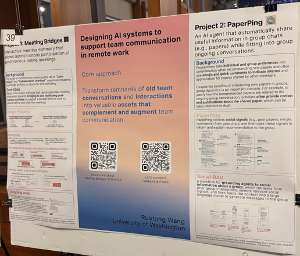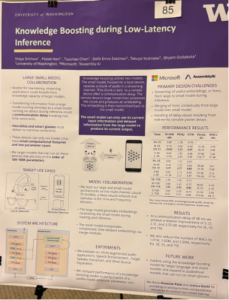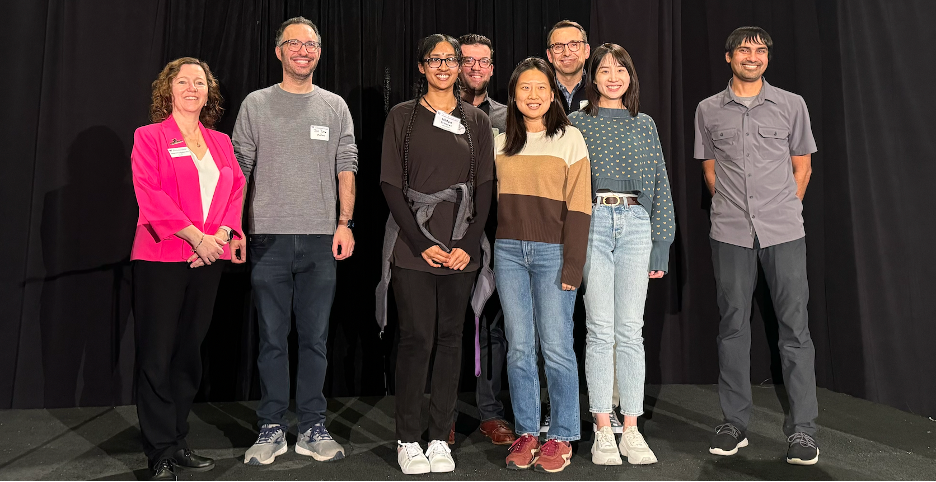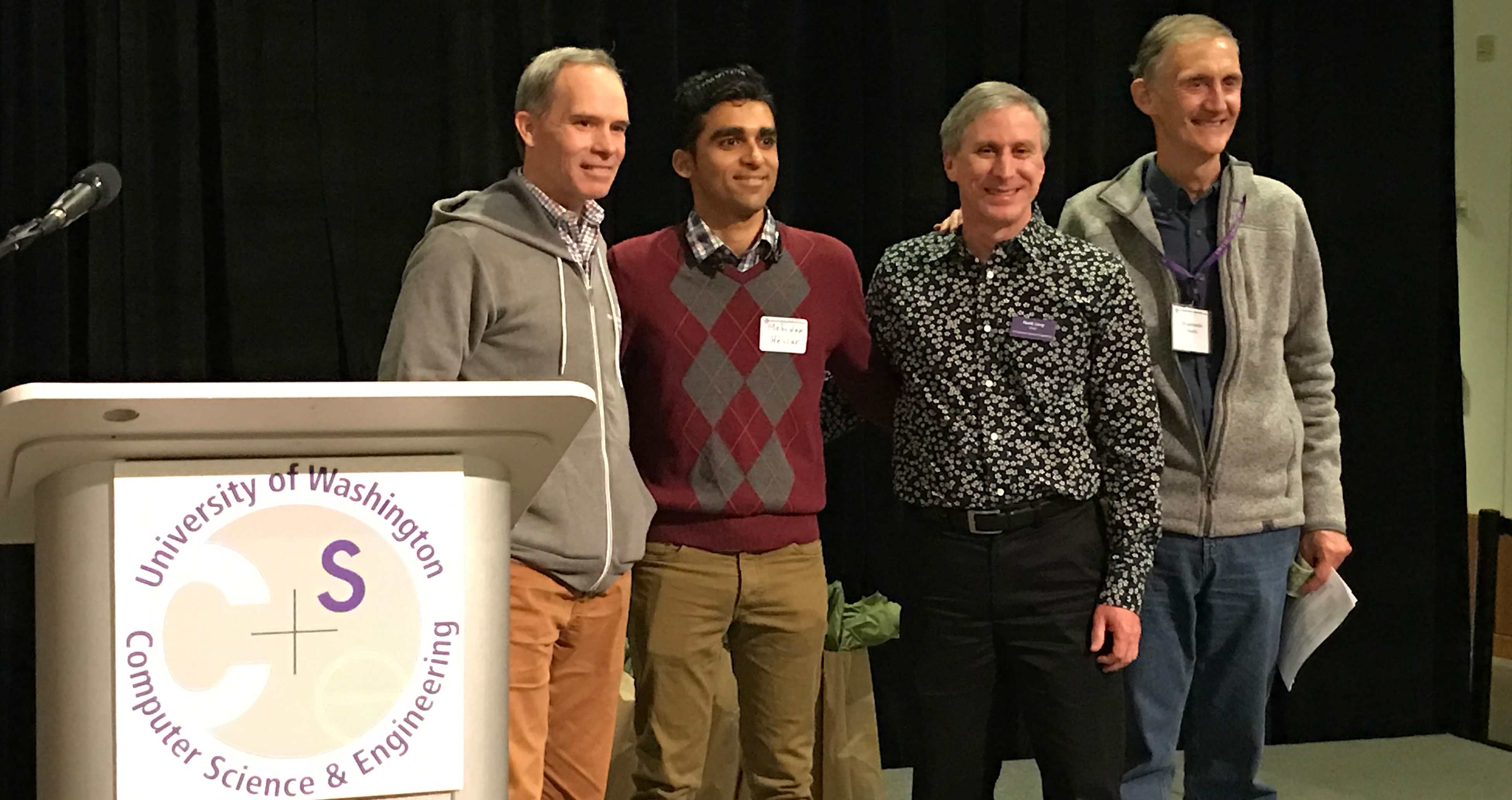The Madrona team and Madrona Prize Winners are flanked by Allen School Director Magdalena Balazinska and Professor Shwetak Patel.
This week, Madrona was thrilled to spend the day and evening at UW’s Paul G. Allen School of Computer Science & Engineering’s Research Showcase. As we have done every year since 2006, we were honored to award the Madrona Prize to research projects that combine excellent, innovative research with the strongest commercial potential. It was a difficult decision, with a record number of 100+ posters presented throughout the Allen Center in research areas across edge & mobile AI, database management, AI systems & infrastructure, human-computer interaction, robotics, health & biology, graphics & vision, and sustainability & safety. Past winners of the Madrona Prize have gone on to raise hundreds of millions of dollars in venture capital and create companies that have been acquired by companies such as Nvidia and Google.
This year the winning team came out of the Social Futures Lab. The winning team, led by primary author and PhD candidate Ruotong Wang and including postdoctoral scholar Xinyi Zhou and master’s student Lin Qiu and advised by Professor Amy X. Zhang, demonstrated design research focused on supporting team communications in remote work environments. The research speaks to the effective design of AI systems supporting remote team communication through facilitating post-meeting activities and by grounding agents in social information that automatically shares relevant information in ongoing group conversations.
Ruotong Wang spoke about her research: “My vision is for AI to seamlessly integrate into collaborative environments, meeting teams where they are and supporting their communication in ways that are both practically useful and socially appropriate.”
Ruotong’s work encompasses several related projects, including Meeting Bridges (AI interactive meeting summaries), PaperPing (AI agent that augments group chats by automatically sharing relevant research summaries), and Social-RAG (workflow for AI agent to retrieve social information about a group).

Madrona Partner Jon Turow described why Madrona sees great commercial applicability to this research: “Today’s meetings are increasingly multichannel—spanning video, chat, and in-person interactions across business, social media, healthcare, and more. This work not only organizes these fragmented conversations but also enriches them by dynamically surfacing relevant content. In business meetings, it can provide real-time summaries and critical data; in healthcare consultations, it enables physicians to access the latest research instantly, empowering professionals to make informed decisions and focus on core tasks.”
Madrona Prizes were also awarded to two runners-up this year:
“Knowledge Boosting During Low-Latency Inference” led by UW PhD student Vidya Srinivas and advised by Professor Shyam Gollakota.
Vidya Srinivas described her project this way: “Wearable devices can greatly benefit from the knowledge capacity of large models but cannot run these models due to resource constraints. Furthermore, real-time applications running on these devices cannot offload computations to larger devices because this would break output latency requirements. Knowledge boosting is a novel framework that allows the performance of local, on-device models to be enhanced through time-delayed hints from a remote larger model while still maintaining real-time operation on the local device. We demonstrate that this framework can lead to significant improvements on multiple speech enhancement and augmentation tasks. Our big-picture vision is to create a modular, general framework that can bring the power of large models to local wearable devices. This can enable a diverse set of applications to run on-device to provide better immersive, accessible, and personalized experiences at an affordable price point on consumer-grade wearable devices.”

Madrona Partner Jon Turow added this about the opportunity for this research work, “As lightweight devices like AirPods and Meta Ray-Bans gain popularity, there’s a need for advanced AI that preserves speed, battery life, and efficient computing. This project’s dual-model approach lets these devices securely offload compute-heavy tasks to nearby high-power devices, like the user’s smartphone, enabling responsive, real-time AI and unlocking powerful new experiences without inflating hardware costs or violating usability constraints.”
Interpreting Nanopore Signals to Enable Single-Molecule Protein Sequencing led by PhD student Daphne Kontogiorgos-Heintz out of the UW Molecular Information Systems Lab (MISL) and advised by Professor Jeff Nivala.
Daphne’s work interprets signals for amino acids or peptide sequences, aiming to deduce the sequence of amino acids in a protein at the molecule level.
Madrona Partner Chris Picardo described the commercial importance of this research to discovering new proteins: “Proteomics is becoming an increasingly important field as researchers and clinicians alike see the value in deeply understanding the make-up of the human proteome. However, it has been difficult to sequence and identify proteins in their native state. This work enables the sequencing of an intact, single-molecule protein at full length using a commercial nanopore sensor. Using this approach, the team has shown the ability to sequence long proteins at high accuracy and detect post-translational modifications, all important capabilities for moving the field rapidly forward.”
The Research Day at the Allen School is focused on bringing industry affiliates into the halls of the school to showcase the latest research by graduate students across many disciplines. There are technical talks throughout the day that culminate in an open house and poster session to showcase the latest research projects and papers that faculty and students are pursuing. Since Madrona’s inception nearly three decades ago, Madrona has funded over 20 companies out of the University of Washington, one of the top five schools for Computer Science in the nation.



